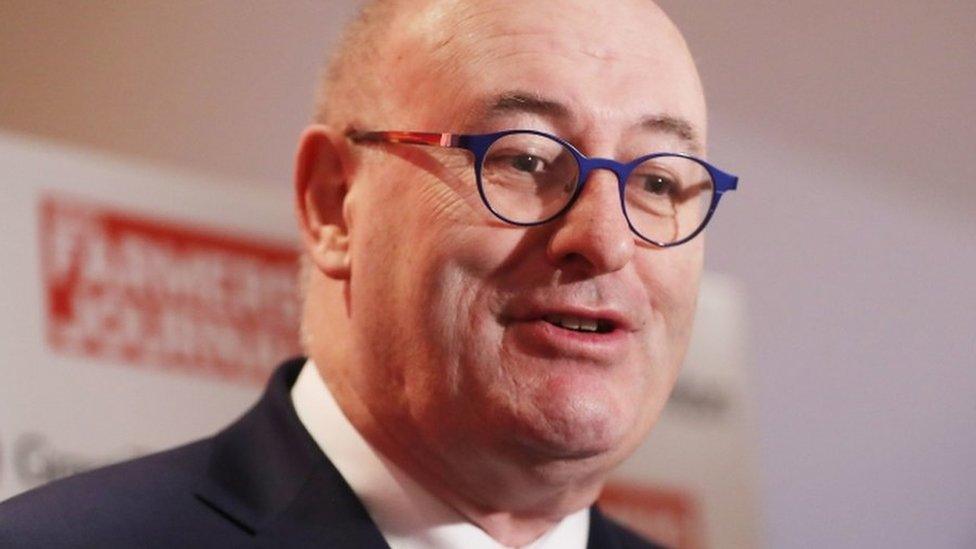Von der Leyen's Commission: The ones to watch at Europe’s new top table
- Published
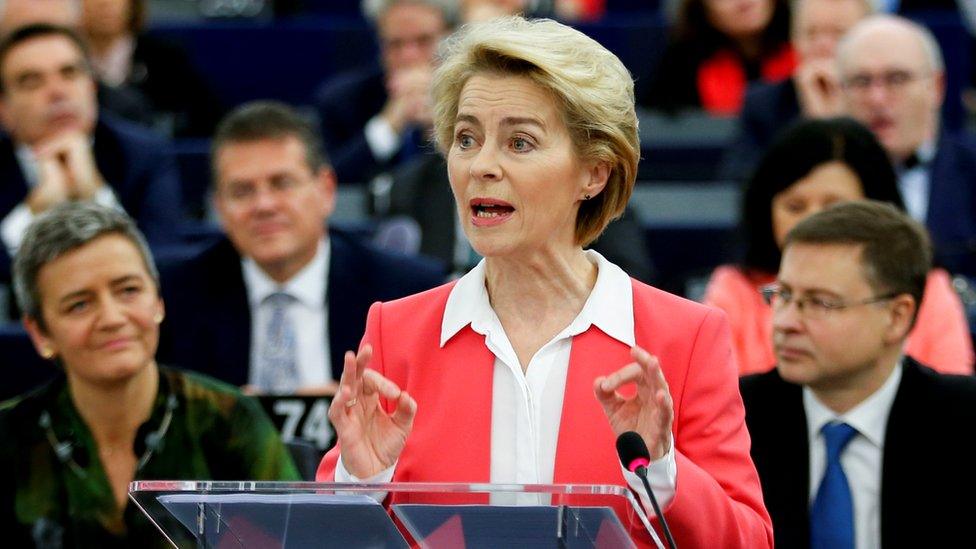
The European Commission's next president Ursula von der Leyen addresses lawmakers
The EU parliament has approved incoming Commission President Ursula von der Leyen's new team by a large majority.
Members of the European Parliament (MEPs) voted in favour of the new commissioners by 461 to 157 against. There were 89 abstentions.
The new team will take office on 1 December, a month later than planned.
Mrs von der Leyen, the first woman to take on the presidency, said earlier that her team would "give Europe a new start" with a focus on climate change.
Wednesday's vote in the European Parliament in Strasbourg required a simple majority for the team to be approved.
Mrs von der Leyen, Germany's former defence minister and long-time close ally of Chancellor Angela Merkel, vowed to build a team to lead the EU's executive body made up of equal numbers of men and women.
Her list of 27 sees 12 women get a seat at the top table - herself included - after weeks of stumbling over nominees grilled by MEPs.
Allow X content?
This article contains content provided by X. We ask for your permission before anything is loaded, as they may be using cookies and other technologies. You may want to read X’s cookie policy, external and privacy policy, external before accepting. To view this content choose ‘accept and continue’.

There is no UK commissioner. Prime Minister Boris Johnson's government opted not to nominate a candidate even though the UK has not yet left the union and the EU has since launched legal action.
"One member of our family intends to leave our union," Mrs von der Leyen said ahead of Wednesday's vote, to cheers and clapping from the UK's Brexit Party MEPs. "A vast majority of this house appears to be very happy that the small [Brexit] group will not be able to clap as loudly any more," she said to rapturous applause.
A number of MEPs who voted on Wednesday voiced objections to some of the chosen candidates, citing conflicts of interest.
So who are some of the key names to look out for?
Thierry Breton (France): Internal Market and Services

"I sold all my shares," the ex-head of French tech giant Atos assured MEPs, when they raised questions about possible conflicts of interest earlier this month.
The 64-year-old was France's second candidate for the von der Leyen team after President Emmanuel Macron's preferred choice, Sylvie Goulard, was rejected.
Mr Breton has stressed the need to regulate the tech sector and bring in single market rules, which he argues would help address challenges from competition outside the EU.
Thierry Breton caused a bit of a stir at the helm of Atos in 2011 when he announced a plan to ban internal email exchanges. The idea, aimed at removing distractions and improving individual productivity, was described at the time as both "bold" and "stupid".
In the years that followed, email correspondence at Atos was gradually replaced with an internal messaging system - a move credited with helping to boost growth.
Margrethe Vestager (Denmark): Vice-President - Europe fit for the Digital Age

A big name in Danish politics, Ms Vestager has spent the past five years as EU competition commissioner, spearheading EU anti-trust investigations that have ended in big fines for US technology giants Google and Apple.
Her approval for this new, high-powered role may well cause technology firms to sit up and take note, as it includes digital reform as well as competition policy.
She has already earned the wrath of US President Donald Trump: "Your tax lady, she really hates the US," he is reported to have told her previous boss, Jean-Claude Juncker.
But Ms Vestager, 51, believes companies must pay their way.
She has previously served as Denmark's economy and interior minister.
Oliver Varhelyi (Hungary): Neighbourhood and Enlargement policy

Mr Varhelyi, 47, was only given the green light last week - a move described by Hungary's nationalist Prime Minister Viktor Orban as the country's "biggest diplomatic success" in a decade.
Hungary's government has clashed with the EU over issues of rule of law and migration in recent years - passing several laws in breach of EU treaties.
Mr Orban said Hungarians could now "increase their influence in European politics" in areas such as migration through EU candidate countries in the Balkans.
During his confirmation hearing earlier this month, MEPs questioned whether Mr Varhelyi's loyalties lay with the bloc as a whole or with Mr Orban. He insisted he would not take orders from Budapest.
The previous Hungarian nominee, Laszlo Trocsanyi, was blocked ahead of confirmation hearings over a conflict of interest.
Dubravka Suica (Croatia): Vice-President for Democracy and Demography

Ms Suica has been an MEP since Croatia joined the EU in 2013 and has vowed to use her position to address Europe's demographic change, describing it as "a root cause of some people losing faith in our democracy".
The former mayor of Dubrovnik - the first female to secure the role - has also said that she will work "towards the rule of law and transparency". But the 62-year-old has come under fire for a lack of transparency relating to her own personal wealth.
"Can you reveal how you acquired a wealth of more than €5m ($5.5m; £4.3m)?" Ms Suica was asked by a member of the European Parliament at a hearing.
She said the figure included the salary of her husband, who had received a significant wage during his many years as a sea captain, and that "everything is clear and transparent".
Ms Suica was also asked about her previous decision to vote against European resolutions calling for greater women's rights, in particular relating to sexual and reproductive health.
Frans Timmermans (Netherlands): Vice-President for European Green Deal

The centre-left politician has already shown a preparedness to tackle the climate crisis, helping to steer through EU legislation banning plastic straws in his role as first vice-president of the Commission.
The multilingual 58-year-old, who has been given the task of helping to implement further environmental policies, received a standing ovation earlier this month when he suggested "a pivotal role" for hydrogen in Europe.
Mr Timmermans said this was because Europe already has a lot of gas infrastructure in place, making the transition smoother and cost-effective.
He has also previously negotiated the EU's 2016 deal with Turkey to reduce the flow of migrants and has warned of the risks of nationalism.
Margaritis Schinas (Greece): Vice-President for Promoting the European Way of Life

This new and broad role gives the current EU Commission spokesman and member of Greece's governing centre-right party New Democracy oversight of migration, security, employment and education.
The very name of his job is a delicate issue. It had to be changed after the previous title - Protecting Our European Way of Life - was criticised for tapping into right-wing rhetoric. It was described by MEPs as "grotesque" and by Amnesty International as "worrying".
Mr Schinas' top two priorities, according to Greek Prime Minister Kyriakos Mitsotakis, should be to reform the EU's asylum system and increase border protection.
Greece has seen a big rise in migrant numbers crossing from Turkey. Five of its islands are under tremendous strain from the arrival of tens of thousands of asylum seekers.
Jutta Urpilainen (Finland): International Partnerships

Ms Urpilainen, the first woman to lead Finland's Social Democratic Party (SDP) in 2008, has said gender equality should be a top priority for all existing and developing EU programmes and policies.
Speaking to MEPs in October, the 44-year-old described the EU's 2030 agenda for sustainable development goals as "a golden opportunity" for Europe to lead the way in eradicating poverty worldwide.
At the age of 22, she set up the Finnish European youth movement, under the umbrella of the Young European Federalists - a group seeking to promote "a more democratic Europe".
Later, as Finland's finance minister in 2012, Ms Urpilainen wrote on her website that her country "would prefer to consider leaving the eurozone rather than to pay other countries' debts in the currency area". The remark led to questions about the SDP's position on Finland's membership and the party was forced to issue a series of denials and clarifications.
Phil Hogan (Ireland): Trade

Mr Hogan - referred to as "Big Phil" - has become the EU's point man in any future Brexit trade negotiations with the UK.
The 59-year-old has said he looks forward to working with the UK in due course, if and when Britain's exit from the EU takes place during his tenure.
But, while it is not clear who will be leading future negotiations on the UK side, Mr Hogan has previously been vocally derisive of Prime Minister Johnson and his approach to Brexit.
"The UK government's only Churchillian legacy will be - 'never have so few done so much damage to so many'. Gambling with peace and the Good Friday Agreement is not good politics," he wrote in the Irish Independent newspaper in August.
Ylva Johansson (Sweden): Home Affairs

Ms Johansson has held ministerial posts in the Swedish government for 11 years under three different prime ministers.
She told MEPs recently that one of her main tasks in her new EU role would be to propose a new pact on migration and asylum, creating legal and safe pathways for migrants. Ever since the influx of migrants and refugees in 2015-16, EU countries have struggled to agree on how to take people in.
"It is difficult, but failure is simply not an option", the 55-year-old said in October.
In an interview last year with Sweden's TT news agency, Ms Johansson said those arriving in Sweden should be made to study the country's laws and way of life. "Many people who move to Sweden come from countries with big differences in daily life and values," she said.

Who else is on the list?
Johannes Hahn (Austria), Budget and Administration; Didier Reynders (Belgium), Justice; Mariya Gabriel (Bulgaria), Innovation and Youth; Stella Kyriakides (Cyprus), Health; Vera Jourova (Czech Republic), Values and Transparency; Kadri Simson (Estonia), Energy; Paolo Gentiloni (Italy), Economy; Valdis Dombrovskis (Latvia), An Economy that Works for People; Virginijus Sinkevicius (Lithuania), Environment, Oceans and Fisheries; Nicolas Schmit (Luxemburg), Jobs and Social Rights; Helena Dalli (Malta), Equality; Janusz Wojciechowski (Poland), Agriculture; Elisa Ferreira (Portugal), Cohesion and Reforms; Adina Valean (Romania), Transport; Maros Sefcovic (Slovakia), Relations and Foresight; Janez Lenarcic (Slovenia), Crisis Management; Josep Borrell (Spain), A Stronger Europe in the World.

How the European Commission works
How the European Commission works
- Published11 December 2020
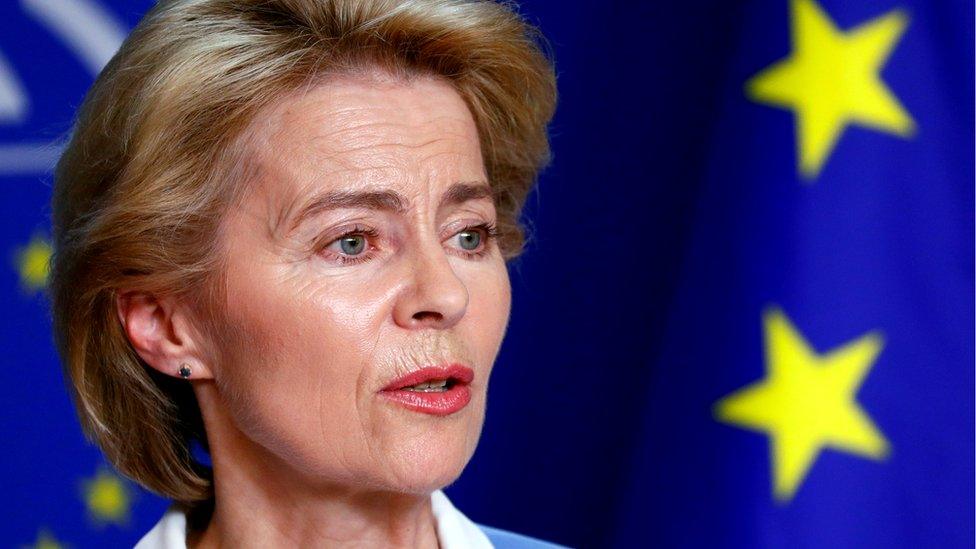
- Published16 July 2019
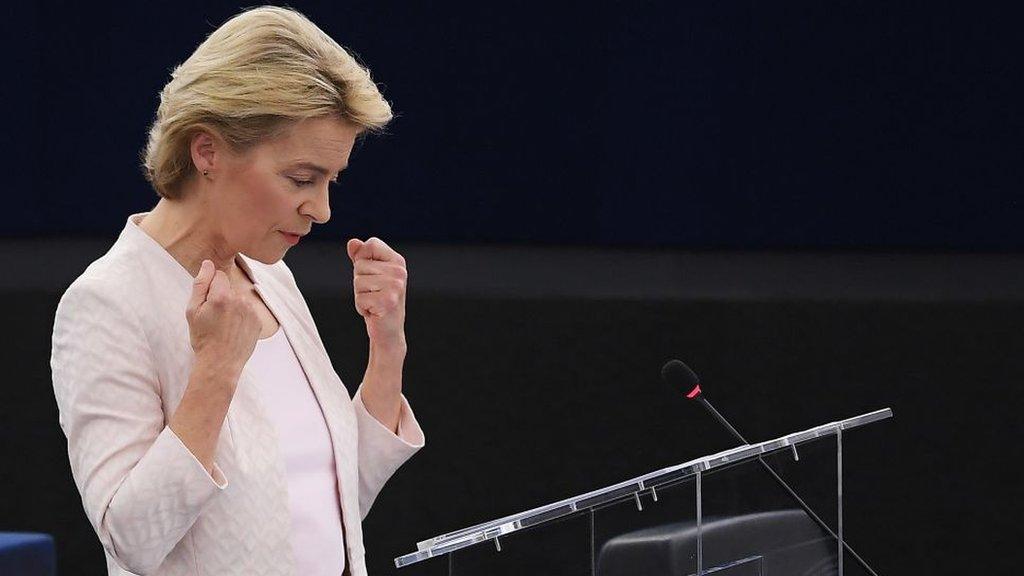
- Published18 July 2018
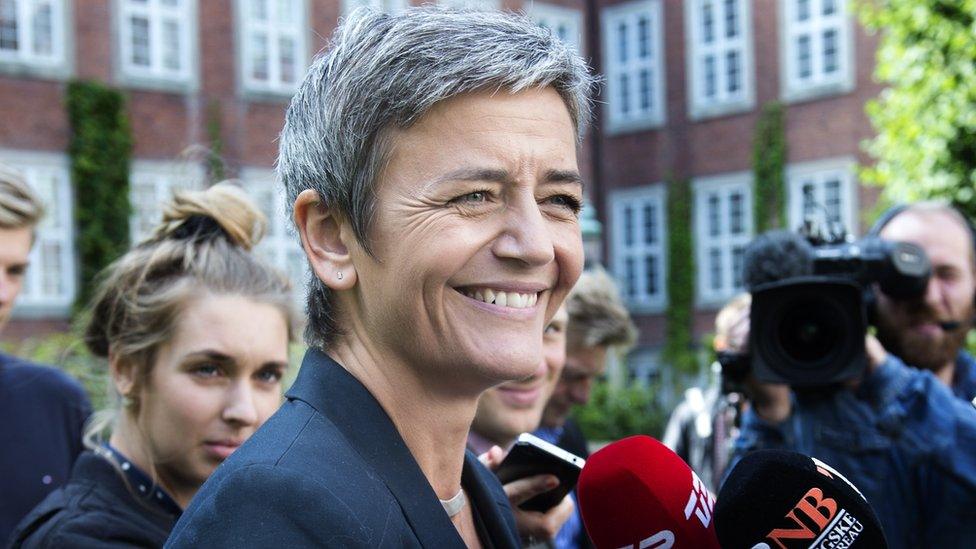
- Published12 September 2019
